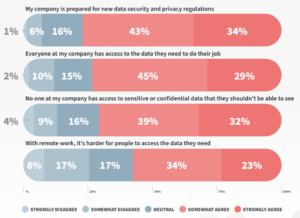
Talend Data Health Barometer Reveals Trouble in Reaching Full Data Potential

Talend has released results from its second annual Data Health Barometer global survey that found 97% of respondents are facing challenges in using data to its full potential.
Talend says a company’s overall data health describes not just the current state of its data, but also how well it supports targeted business outcomes. While 99% of companies recognize data as critical for their success, nearly half say using data to drive business impact is not easy.
The company cites a disconnect between data and decision making, and key findings uncovered by the survey include how data management is worsening by the year, there is a data literacy skills gap, data access issues persist, and data quality and trust concerns remain.
Compared to the first Data Health Barometer of 2021, companies are rating their data management around 10 points lower this year. Talend lists the five markers of healthy data as timeliness, accuracy, consistency, accessibility, and completeness. Timeliness and accessibility saw the largest drops at –29 points and –15 points, respectively, and 57% of respondents admitted to struggling with data access due to remote work.
The skills gap is also a barrier, as one in three of those surveyed disclosed having reservations about how well employees understand the data they use in their work. Only 26% of total respondents strongly agreed their entire organization understands company data. Data experts were the most critical of company-wide data literacy, with 15% either somewhat or strongly disagreeing that all employees understand the data.
Speed and flexibility of data access is a concern for the 41% who say they do not have fast or complete access to the data they need. Talend cites this as troubling because increasing revenue and optimizing costs were ranked as the top priorities for data use, increasing by 10 points and 13 points respectively from last year. For 57% of those surveyed, data infrastructure has not kept up with remote work, as they reported remote work has had a negative impact on data agility.
Finally, data quality and trust continue to be sore points in the quest for using data effectively. Over one-third of respondents reported that trusting the data they rely upon for decision making is a major challenge, and nearly half indicated that ensuring data quality is their biggest problem. According to Gartner, poor data quality costs organizations an average of $12.9 million per year. While 82% of total respondents in Talend’s survey said they trust the data they use, only 75% of those surveyed from the business side of organizations agree, leaving a quarter of those making business decisions distrustful of the data.

These results show 57% of companies report that remote working has had a negative impact on their data agility. Source: Talend
While the data health barometer highlights the issues that keep businesses from using data most effectively, it also reveals the strategies companies are using to solve these problems. Data literacy programs can help with the skills gap, and 65% said there is a data literacy program in place at their company. For nearly half, or 48%, these programs are led by the CDO or chief analytics officer. Additionally, 80% of respondents reported their organizations have standard metrics or KPIs in place, such as recency, completion, and relevance, to assess data quality. According to the results, technology companies and those in the financial services and insurance sectors are leading the pack in establishing standard data metrics, while healthcare, manufacturing, retail, and education are left to catch up.
Talend believes healthy data practices are the key to getting the most from an organization’s data, especially in turbulent economic times.
“In the coming years, businesses are only going to become more reliant on data to navigate the challenges of a turbulent economy and an increasingly competitive marketplace,” said Christal Bemont, CEO at Talend. “By putting a focus on reliable data — supported by a strong data culture with a focus on agility and trust — businesses can not only weather any storm but come out ahead. Having a healthy data environment in place gives organizations the power to run lean in tough times without sacrificing their long-term strategy.”
Check out the report here.
Related Items:
How Data Literate are the ‘D/Natives’?
Talend Introduces Industry-First Measure of Data Health































